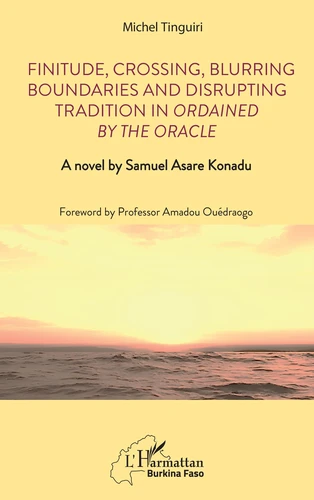Finitude, Crossing, Blurring Boundaries and Disrupting Tradition in Ordained by the Oracle. A novel by Samuel Asare Konadu
Par :Formats :
Disponible dans votre compte client Decitre ou Furet du Nord dès validation de votre commande. Le format PDF est :
- Compatible avec une lecture sur My Vivlio (smartphone, tablette, ordinateur)
- Compatible avec une lecture sur liseuses Vivlio
- Pour les liseuses autres que Vivlio, vous devez utiliser le logiciel Adobe Digital Edition. Non compatible avec la lecture sur les liseuses Kindle, Remarkable et Sony
 , qui est-ce ?
, qui est-ce ?Notre partenaire de plateforme de lecture numérique où vous retrouverez l'ensemble de vos ebooks gratuitement
Pour en savoir plus sur nos ebooks, consultez notre aide en ligne ici
- Nombre de pages154
- FormatPDF
- ISBN978-2-336-41969-5
- EAN9782336419695
- Date de parution04/01/2024
- Copier Coller01 page(s) autorisée(s)
- Protection num.Digital Watermarking
- Taille1 Mo
- ÉditeurL'Harmattan
- PréfacierAmadou Ouédraogo
Résumé
The book analyzes the novel Ordained by the Oracle through socio-cultural, symbolic and anthropological frameworks. It examines funeral rituals, the duality between the visible and invisible worlds, and the role of the oracle, spirits and ancestors in society. The study sheds light on the notions of space, time, myth and reality in the Akan society. It demonstrates that literature crosses disciplinary boundaries and can be seen as a form of anthropology.
The analysis will be of interest to students and researchers in African studies, literature, religion, culture, sociology, and anthropology.
The analysis will be of interest to students and researchers in African studies, literature, religion, culture, sociology, and anthropology.
The book analyzes the novel Ordained by the Oracle through socio-cultural, symbolic and anthropological frameworks. It examines funeral rituals, the duality between the visible and invisible worlds, and the role of the oracle, spirits and ancestors in society. The study sheds light on the notions of space, time, myth and reality in the Akan society. It demonstrates that literature crosses disciplinary boundaries and can be seen as a form of anthropology.
The analysis will be of interest to students and researchers in African studies, literature, religion, culture, sociology, and anthropology.
The analysis will be of interest to students and researchers in African studies, literature, religion, culture, sociology, and anthropology.






